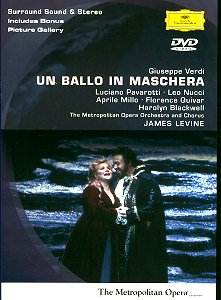The DVD is a recording of a production of the New York
Metropolitan Opera in 1991 and is very much what we would expect from
this famous company. It is a traditional production, well staged and
sung by a high class cast.
Verdi and his librettist had originally intended that
The Masked Ball would be set in the late 18th Century setting of the
court of Gustavus III of Sweden. However this was not acceptable to
the censor and it was changed to an imagined colonial Boston. In this
production the opera has been set in its intended Swedish setting and
appropriate changes made to the text. The staging reflects the setting
and the scenery has a deliberately heavy feel which accentuates the
sombre atmosphere of the opera. Nonetheless, all sets and costumes are
lavish clearly the Met does not penny pinch with its productions.
In particular the final scene "A large and sumptuously decorated
ballroom" accurately reflects the description and the fancy dress
costumes are really splendid.
The Masked Ball is a favourite role of Pavarotti who
is in good form and his performance would be hard to surpass. He has
great stage presence and his acting whilst rather static is effective
due to his expressive facial characterisation which is well caught on
film. The role of Renato, the friend who turns assassin is an important
baritone part which is performed here by Leo Nucci who is excellent.
The part of Amelia is taken by the native New Yorker Aprile Milo who
has a beautiful soprano voice (but does not surpass the stunning Callas
performance in the famous 1956 recording). Florence Quivar as Ulrica
the fortune teller sings well and has good stage presence; Harolyn Blackwell
has a good light soprano voice but has a tendency to overact. The minor
characters and the chorus are very good.
As in all the later Verdi operas, the Orchestra has
a vital and far from easy role. James Levine is an experienced conductor
and produces good results from the excellent orchestra and achieves
a good balance with the voices (with the orchestra not being as receded
as it so often is in recorded opera); he is successful in achieving
the right balance between the often light music in juxtaposition to
the underlying drama. In the final act, however his tempi seemed increasingly
slow towards the dramatic ending.
Overall this is a good presentation of a musically
satisfying performance.
Arthur Baker


